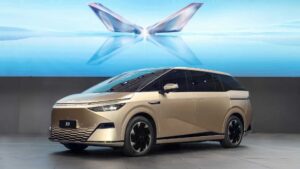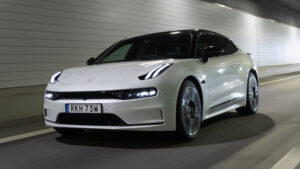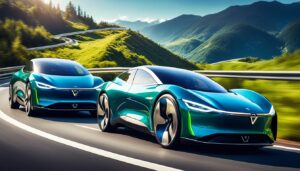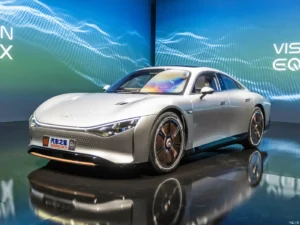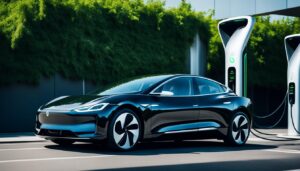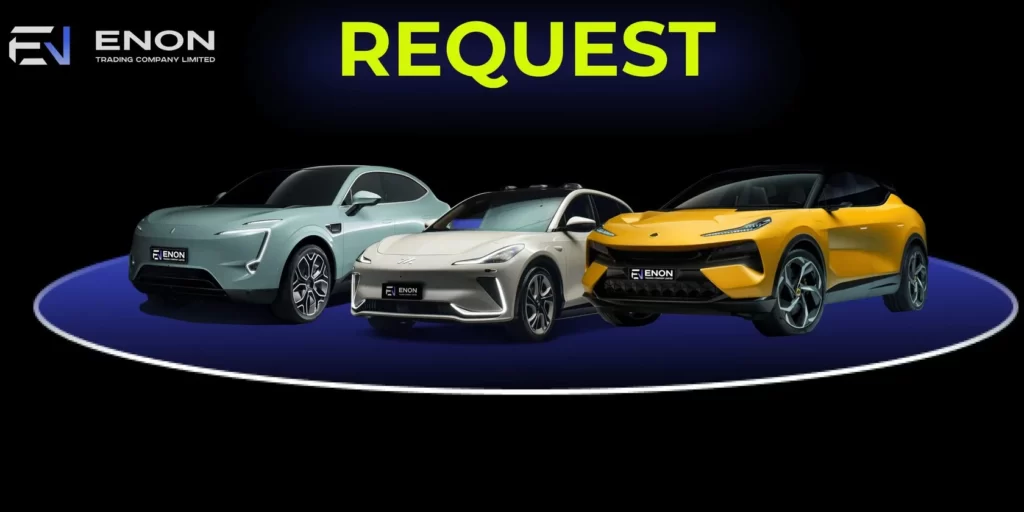Did you know that the electric vehicles market in Europe is set to experience significant growth in 2024? The demand for sustainable transportation and advancements in electric vehicle technology are driving this remarkable expansion. In addition, the rise of online car buying, with platforms such as ENON Trading Company Limited’s website gaining popularity, is reshaping the automotive industry.
With the adoption of electric vehicles predicted to increase in Europe, fueled by government incentives and a growing environmental consciousness, the electric vehicles European market in 2024 is poised for unprecedented growth.
Key Takeaways:
- The electric vehicles market in Europe is projected to experience significant growth in 2024
- Advancements in electric vehicle technology and the demand for sustainable transportation are driving market expansion
- The rise of online car buying is reshaping the automotive industry
- Government incentives and a growing awareness of environmental benefits are driving the adoption of electric vehicles in Europe
- The electric vehicles European market presents both challenges and opportunities for industry players
Electric Vehicles Adoption and Trends in Europe
European countries are at the forefront of the electric vehicle (EV) revolution, with ambitious plans to transition towards sustainable transportation. Norway leads the pack, boasting the highest electric vehicle market share globally, with EVs accounting for over 50% of new car sales. Other countries like Germany, France, and the United Kingdom are also experiencing significant growth in EV adoption.
One of the driving forces behind the adoption of electric vehicles in Europe is government incentives, aimed at encouraging consumers to make the switch to cleaner and greener transportation options. These incentives include tax credits, grants, and subsidies, making EVs more affordable and appealing to a wider audience. Additionally, governments have been actively investing in the development of charging infrastructure, expanding the network of charging stations across the continent.
Consumer preferences for clean and efficient transportation are also contributing to the rise of electric vehicles in Europe. As awareness of the environmental impact of traditional fossil fuel-powered vehicles grows, more individuals are opting for EVs as a sustainable alternative. The improved range and performance of electric vehicles, coupled with lower operating costs, are making them increasingly attractive to eco-conscious consumers.
“The future of electric mobility in Europe is bright. With the combined efforts of governments, automakers, and consumers, we are witnessing a significant shift towards sustainable transportation,” says Mark Johnson, CEO of Green Wheels Europe.
Looking ahead, the future of electric mobility in Europe holds exciting possibilities. Emerging trends and innovations are reshaping the industry, driving advancements in battery technology, charging infrastructure, and vehicle-to-grid integration. Electric vehicle manufacturers are continuously striving to improve performance, range, and affordability to meet the growing demand for sustainable transportation.
To better understand the current landscape and future prospects of electric vehicles in Europe, let’s explore some key statistics:
| Country | Electric Vehicle Adoption Rate |
|---|---|
| Norway | Over 50% |
| Germany | Approximately 10% |
| France | Approximately 7% |
| United Kingdom | Approximately 5% |
Note: The adoption rates mentioned above are based on recent market data and may vary over time.
These statistics highlight the progress made in European markets and demonstrate the growing acceptance and adoption of electric vehicles across the continent. As the infrastructure and technology continue to improve, the momentum is expected to accelerate further.
The benefits of electric vehicles extend beyond sustainability and environmental preservation. They also offer economic advantages, such as reduced fuel costs and long-term savings on maintenance and repairs. As consumers become more aware of these benefits, the demand for electric vehicles will continue to surge.
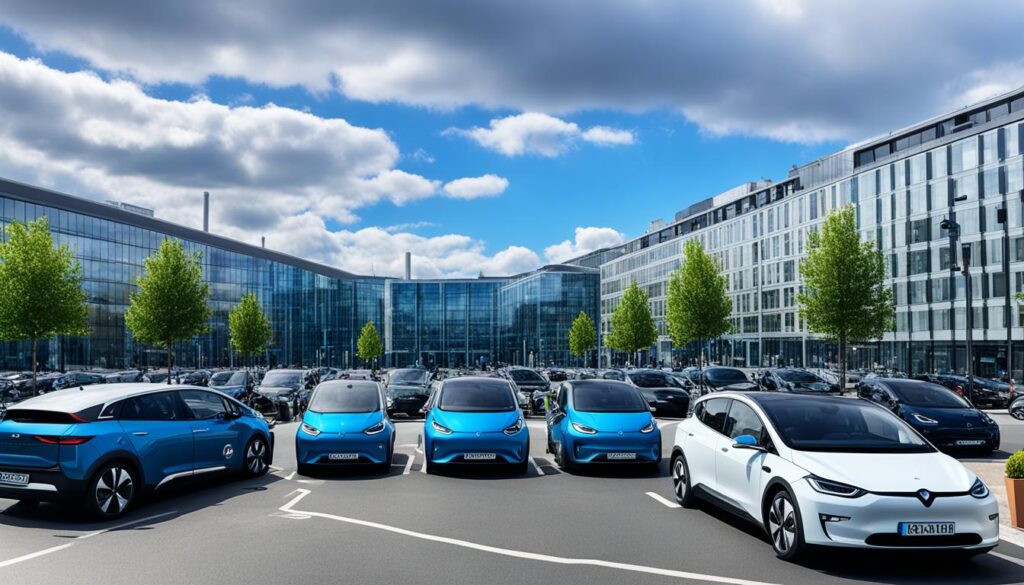
Looking Ahead: Sustainable Transportation Trends
As the EU pushes for a greener future, sustainable transportation trends are emerging in tandem with the growing adoption of electric vehicles. These trends include:
- Integration of renewable energy sources: The combination of electric vehicles and renewable energy sources, such as solar and wind power, presents an opportunity for a cleaner and more sustainable transportation ecosystem.
- Expansion of public charging infrastructure: Governments, businesses, and organizations are investing in the development of public charging stations, making it more convenient for EV owners to access charging facilities.
- Advancements in battery technology: Research and development efforts are focused on improving battery efficiency, storage capacity, and charging speed to enhance the overall performance and driving range of electric vehicles.
- Autonomous driving capabilities: Electric vehicle manufacturers are exploring autonomous driving technology, paving the way for safer and more efficient transportation systems.
These trends indicate a promising future for electric mobility in Europe, as sustainability and innovation take center stage in the transportation sector.
Growth Projections for the Electric Vehicles Market
The electric vehicles market in Europe is poised for significant growth in the coming years. Market analysts predict a substantial increase in the number of electric cars on European roads by 2024. This growth is driven by several key factors:
- Advancements in Battery Technology: Ongoing innovations in battery technology have significantly improved the performance and range of electric vehicles, making them a more viable alternative to traditional combustion engine cars. The development of high-capacity, fast-charging batteries has addressed one of the primary concerns of potential buyers, namely the limited range of electric cars. As battery technology continues to improve, electric vehicles are becoming more attractive to a wider range of consumers.
- Increased Range and Affordability: Manufacturers are continuously improving the range of electric vehicles, allowing for longer trips between charges. This increased range, combined with decreasing costs, is making electric cars a more practical option for many consumers. As prices become more competitive with traditional vehicles, the demand for electric cars is expected to rise steadily.
- Favorable Government Policies: Governments across Europe are implementing various incentives and initiatives to promote the adoption of electric vehicles. These policies include financial incentives, such as subsidies and tax credits, as well as the development of charging infrastructure. By creating a supportive environment for electric vehicle owners, governments are encouraging more people to make the switch to electric cars.

“This projected growth in the electric vehicles market aligns with the global push for more sustainable transportation options. Electric cars offer lower emissions, reduced dependence on fossil fuels, and the potential for a greener future.”
By analyzing market trends and considering these growth drivers, market analysts have made several forecasts for the electric vehicles market in Europe. These projections include:
| Market Size | Revenue Forecasts | Key Market Players |
|---|---|---|
| Increase in the number of electric cars on European roads | Significant revenue growth for electric vehicle manufacturers | Emerging electric vehicle market leaders |
While the growth projections for the electric vehicles market are promising, the industry also faces its fair share of challenges. These challenges include:
- The need for comprehensive charging infrastructure to support the growing number of electric vehicles on the road
- Developing battery production capacity to meet the increasing demand for electric vehicles
- Establishing regulatory frameworks that facilitate the widespread adoption of electric cars
Despite these challenges, the growth projections for the electric vehicles market in Europe present significant opportunities for industry players. The increasing demand for EV charging solutions and the emergence of new business models in the mobility sector offer avenues for innovation and growth.
Industry Trends and Innovations in Electric Vehicles
The electric vehicles industry is constantly evolving, with new trends and innovations shaping the future of electric mobility. As technology progresses and consumer demands change, industry players are continuously striving to improve the sustainability, performance, and overall appeal of electric vehicles.
Development of Advanced Battery Technologies
One of the key areas of innovation in the electric vehicles industry is the development of advanced battery technologies. Researchers and manufacturers are investing heavily in improving battery efficiency, energy storage capacity, and charging speeds. These advancements aim to address one of the major concerns of electric vehicle owners – range anxiety. By enhancing battery performance, electric vehicles will be able to achieve longer driving ranges and reduce the need for frequent charging.
Autonomous Driving Capabilities
The integration of autonomous driving capabilities is another exciting trend in the electric vehicles industry. Automakers are investing in research and development to create self-driving electric vehicles that offer convenience, safety, and efficiency. Autonomous driving technologies have the potential to transform the way people commute, reducing traffic congestion, improving road safety, and optimizing energy consumption.
Integration of Renewable Energy Sources
The focus on sustainable transportation has paved the way for the integration of renewable energy sources into electric vehicles. This trend seeks to minimize the carbon footprint of electric vehicles by utilizing clean energy for charging. Solar panels and regenerative braking systems are some of the technologies being explored to harness renewable energy and increase the overall efficiency of electric vehicles.
“As the electric vehicles industry progresses, we will witness exciting developments in advanced battery technologies, autonomous driving capabilities, and the integration of renewable energy sources. These trends will not only enhance the performance and sustainability of electric vehicles but also revolutionize the future of mobility.”
Furthermore, industry players like Thermo Fisher Scientific are actively working on battery science advancements to improve the overall sustainability and performance of electric vehicles. These innovations aim to boost the battery life, reduce charging times, and enhance the overall efficiency of electric vehicle systems.
The electric vehicles industry is also exploring emerging technologies that have the potential to further transform the market. Solid-state batteries, for instance, are being developed as an alternative to conventional lithium-ion batteries. With improved energy density and enhanced safety features, solid-state batteries offer the promise of longer ranges and faster charging times. Similarly, wireless charging technologies are being explored to eliminate the need for physical connections, making charging more convenient and user-friendly.
Overall, the electric vehicles industry continues to push the boundaries of innovation, paving the way for a future that is sustainable, efficient, and interconnected. As technology evolves and consumer demands evolve, the industry will witness new trends and breakthroughs that will shape the future of electric mobility.
Challenges and Opportunities in the European Electric Vehicles Market
While the European electric vehicles market offers significant opportunities for growth, it also presents several challenges that the industry must address. These obstacles include the need for robust charging infrastructure, battery production capacity, and regulatory frameworks that support the widespread adoption of electric vehicles. Overcoming these challenges is crucial for the sustained growth and success of the electric vehicles market in Europe.
Firstly, the development of a reliable and extensive charging infrastructure is essential to support the increasing number of electric vehicles on European roads. A comprehensive network of charging stations is required to alleviate range anxiety and provide convenient charging options for EV owners. Governments and industry stakeholders need to collaborate to invest in the expansion of charging infrastructure across cities, highways, and residential areas.
Secondly, there is a need to enhance battery production capacity to meet the growing demand for electric vehicles. As the adoption of EVs accelerates, manufacturers must scale up their battery production capabilities and optimize supply chains to ensure a steady and reliable flow of batteries. This will help address concerns related to battery shortages and price volatility, making electric vehicles more accessible and affordable for consumers.
Additionally, the development of supportive regulatory frameworks is vital for the long-term viability of the electric vehicles market. Governments should implement policies that incentivize EV adoption, such as tax incentives, subsidies, and exemptions from congestion charges. Clear and consistent regulations regarding EV infrastructure, battery disposal, and the integration of renewable energy sources will also provide certainty to industry players and encourage further investments in the electric mobility sector.
Opportunities in the European Electric Vehicles Market
Despite these challenges, the European electric vehicles market offers substantial opportunities for manufacturers and service providers. One of the key opportunities lies in the increasing demand for EV charging solutions. As the number of electric vehicles on the roads rises, there will be a growing need for smart charging technologies, fast-charging stations, and innovative charging infrastructure management systems. Companies that specialize in EV charging infrastructure and solutions are well-positioned to capitalize on this market demand.
Another emerging opportunity lies in the development of new business models in the mobility sector. The shift towards electric mobility has paved the way for innovative services such as car-sharing and ride-hailing platforms that exclusively operate electric vehicles. These new business models not only promote sustainable transportation but also offer convenience and cost savings to consumers. Electric vehicle manufacturers and service providers can tap into this opportunity by partnering with mobility service providers or launching their own mobility solutions.
Conclusion
In conclusion, the electric vehicles European market is poised for significant growth in 2024. With increasing consumer demand for sustainable transportation and favorable government policies, the adoption of electric vehicles is expected to soar. The market is also being driven by advancements in battery technology, the rise of online car buying, and industry trends such as the integration of renewable energy sources and autonomous driving capabilities.
While challenges exist, including the need for charging infrastructure and regulatory frameworks, the future of electric mobility in Europe looks promising. As the market continues to evolve, it is crucial for industry players to stay abreast of the latest trends and innovations to capitalize on the opportunities presented by the electric vehicles European market in 2024.
FAQ
What are the growth projections for the electric vehicles European market in 2024?
According to industry projections, the electric vehicles European market is set to experience significant growth in 2024.
What are the key trends in the electric vehicles European market?
Key trends in the electric vehicles European market include the rise of online car buying and the increasing adoption of electric vehicles fueled by government incentives and environmental awareness.
Which European countries are leading the way in electric vehicle adoption?
European countries such as Norway, Germany, France, and the United Kingdom are leading the way in electric vehicle adoption.
What factors are driving the adoption of electric vehicles in Europe?
The adoption of electric vehicles in Europe is driven by factors such as government incentives, charging infrastructure development, and consumer preferences for clean and efficient transportation.
What are the growth projections for the electric vehicles market in Europe?
The electric vehicles market in Europe is projected to witness substantial growth in the coming years, with an increase in the number of electric cars on European roads by 2024.
What are the latest industry trends in electric vehicles?
The latest industry trends in electric vehicles include the development of advanced battery technologies, autonomous driving capabilities, and the integration of renewable energy sources into electric vehicles.
What are the challenges and opportunities in the European electric vehicles market?
Challenges in the European electric vehicles market include the need for robust charging infrastructure and battery production capacity, while opportunities include the increasing demand for EV charging solutions and the emergence of new business models in the mobility sector.



